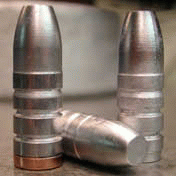

 The Accurate Reloading Forums
The Accurate Reloading Forums  THE ACCURATE RELOADING.COM FORUMS
THE ACCURATE RELOADING.COM FORUMS  Guns, Politics, Gunsmithing & Reloading
Guns, Politics, Gunsmithing & Reloading  Cast Bullets
Cast Bullets  6.5 Swede Boolit's Disappearing??
6.5 Swede Boolit's Disappearing??Go  | New  | Find  | Notify  | Tools  | Reply  |  |
| one of us |
"Now as to why the 6.5 bullets disappear like a flight of Navy SNJ's over the Bermuda Triangle, I ain't got a clue and ain't going to worry about it" Now.. something interastin' Jump. I like Beagle's answer BTW-- answers the Q on a lot of fronts. Yet this what I proposed to Oldfeller couple days back... tell me what ya think one and all. "Nice neatly-folded-over bent bananas flying off to the right are one thing, but some of very fastest, fully-hardened ones never seem to arrive there at all ......" Oldfeller. Been there and done that. I remember a test run once using the new Lee [at the time] factory crimp die. I followed the DI-rections and got a awful firm crimp. Reason was the cast bullet was larger than the caliber .308 which Lee's instructions were tailored to. LSS-- this load previously printed 2-3" at 100 didn't hit a thing... nothing that I could hear or see. Understand this loading >2600 fps or more. I de-duced 'blow'n them thru', something I'd managed previously. The pressure is high enough to overcome the holding power of the bullet surface and it just blows on by the rifling. Complete slugging of the bullet down the bore. The bullet's surface strength isn't strong enough to withstand that amount of pressure and acceration. Fire one of your 'no hit'm' into a large container of water and examine the engraving marks. Lee did this test BTW in his manual using a fast shotgun powder-- getting to a point where the bullet failed to take the rifling. | ||
|
| one of us |
Somebody a lot more ambitious and curious than me might wanna set up a frame to hold a sheet of paper about 8'x8' and shoot that disappearing load at much shorter distances. Wouldn't surprise none to find a bunch of birdshot size holes from some bullets. That's a lot of rpms. | |||
|
| one of us |
Quote: Leftoverdj now that sounds like a plan! Something easier than the pool too. Hey I just disagree-- if you all prove me wrong we'll have a good chuckle on me, no problem. I think the bullet is exiting with less than enough dynamic stability-- wobbing and tumbles. Methinks it's loosing bite in the barrel and slugging/skidding. I seem to remember running the design for Oldfeller in Greenhill and it was somewhat near the limits. Other possible is it's length-- entering the rifling off angle and bending the base which gets a gas kick at exit off to one side. Given the kind of gun and various reloading runouts that'd be easy to do. But slugs flying apart...nope.  Slugs are being found right? Bent etc? I rest my case. Slugs are being found right? Bent etc? I rest my case. | |||
|
| one of us |
Quote: Jump there's no doubt you were kidding about the book. I was not. Go to the library and try and find something to read. Even the 'books' about historical figures are full of political bullsh**. I've about given up. Book stores? Sheeeiiitt-- that's a joke. You write it Jump and I wanna read it. | |||
|
| one of us |
Jump, You have such a way with words: E.g., "puked out of the bbl." I'm still laughing! All the best, ...Maven | |||
|
| One of Us |
What about the guys shooting cast out of their 1/7 twist AR15's, do they have this problem? I know the bullets for it aren't as long as a 6.5 but then again they aren't as fat either. I have an AR15 but haven't ever shot cast through it even though I have a 22 cal mould. Maybe a high velocity test won't hurt anything and maybe get some useful information. | |||
|
| Powered by Social Strata |
| Please Wait. Your request is being processed... |
|
 The Accurate Reloading Forums
The Accurate Reloading Forums  THE ACCURATE RELOADING.COM FORUMS
THE ACCURATE RELOADING.COM FORUMS  Guns, Politics, Gunsmithing & Reloading
Guns, Politics, Gunsmithing & Reloading  Cast Bullets
Cast Bullets  6.5 Swede Boolit's Disappearing??
6.5 Swede Boolit's Disappearing??

Visit our on-line store for AR Memorabilia

